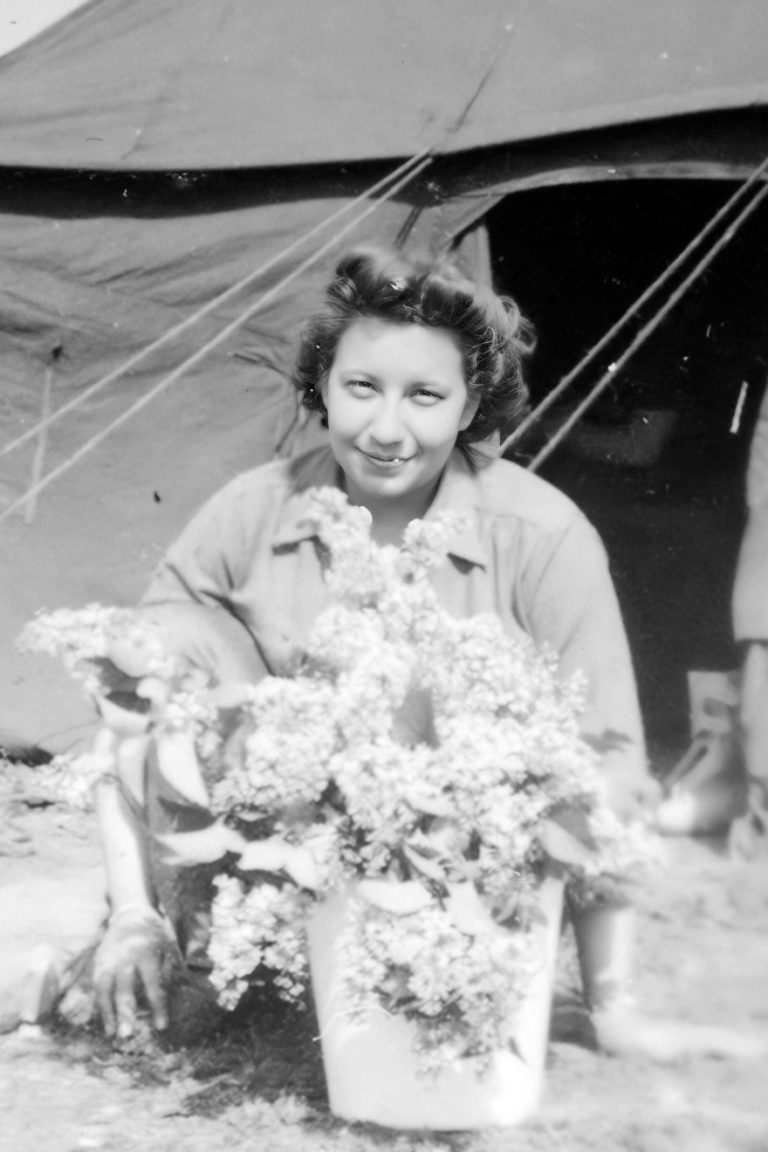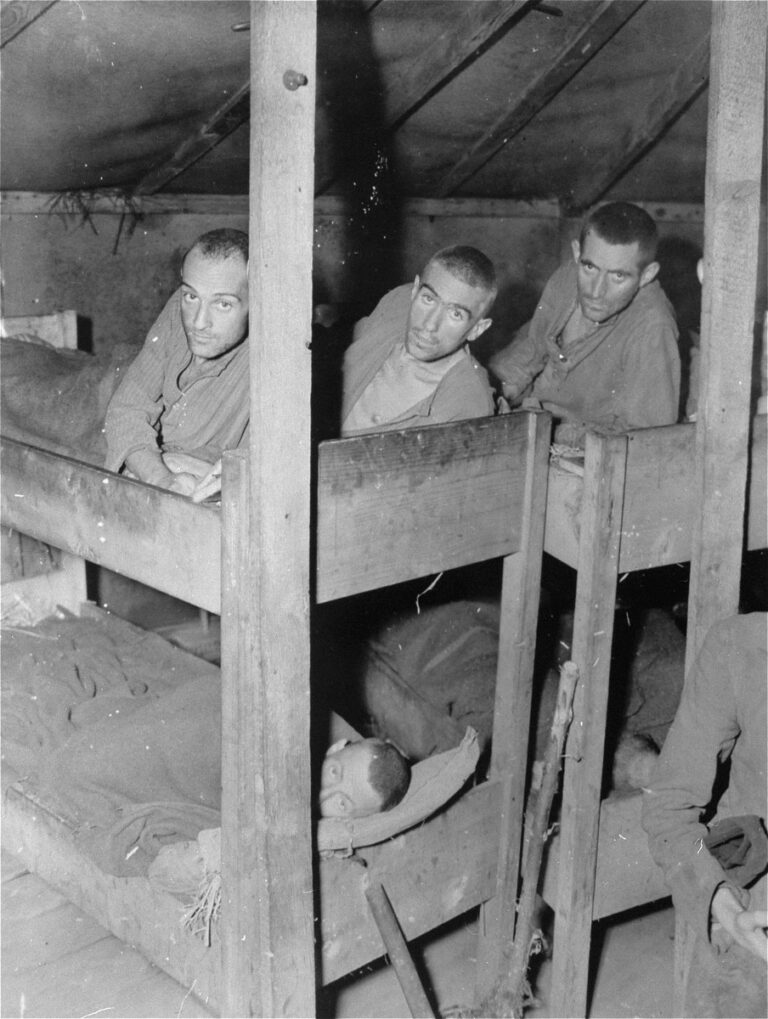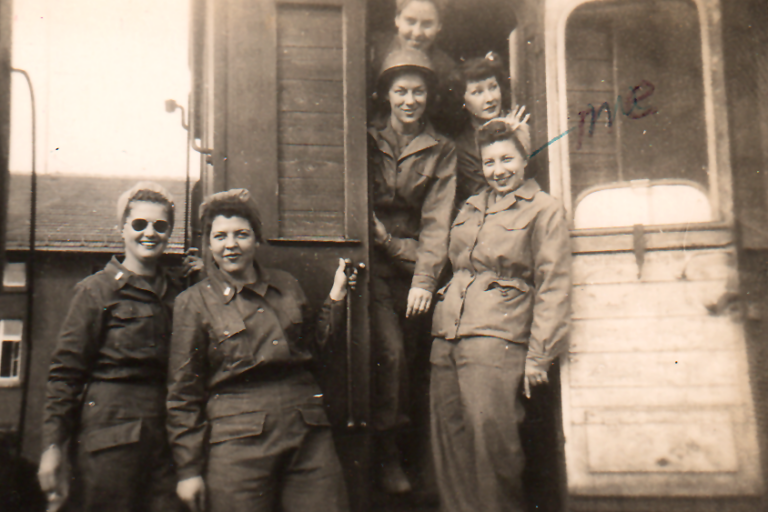Charlotte Chaney was living in Plainview, New Jersey in 1943 when she volunteered to join the U.S. Army as a nurse. In January 1945, her unit was sent overseas to France. At the beginning of May 1945, she was in Munich when she learned that she was being sent to a nearby place called Dachau.

Charlotte Chaney’s 1993 interview with Mort Horvitz for the museum’s GIs Remember exhibit provides a deeply personal account of her experiences as a Jewish American nurse at Dachau concentration camp following its liberation. Her story, set against the broader backdrop of American Jewish liberators, offers a unique perspective on this pivotal moment in history.
Dachau, one of the first and most notorious concentration camps, symbolized the horrors of the Holocaust. Its liberation on April 29, 1945, by the U.S. Army, including many Jewish American soldiers, marked a significant chapter in World War II, revealing the extent of Nazi atrocities to the world. After the Americans arrived, reports of the conditions in the camps could no longer be dismissed as mere propaganda.
Chaney, reflecting on her decision to enlist, said, “I was young—I was 22 years old—and I felt, well, my country’s at war, I felt I would like to join.” Her path led her to Dachau, where she, like many Jewish American liberators, confronted the horrors her own people had endured.
Upon arriving at Dachau, Chaney described the scene a couple of days after liberation: “There were rooms there that were packed with 300 men and triple decker beds like lofts—these men were packed in; some were dead, some were dying. It was just…you just couldn’t believe what was going on.” Her firsthand account echoes the sentiments of many Jewish liberators who were often overwhelmed by the sight of the death and suffering.
Chaney and her unit’s immediate task was to provide medical care to the survivors. She detailed the work they provided to support survivor’s basic needs: “We started to delouse these people. We were covered ourselves with masks, with caps, with gowns—99% of them had TB and malnutrition and G-d knows what.” Chaney was particularly moved by the presence of several babies in their camp.

The role of Jewish American liberators like Chaney was important and multi-faceted. Jewish identity added another layer to their experience. The soldiers and nurses who were liberating camps were also members of the community that had been persecuted. Many Jewish liberators were Yiddish speakers and the only ones capable of speaking with survivors. Chaney recalled the communication challenges: “My Jewish wasn’t that good, but I spoke Jewish and tried to communicate with some of these people there, but some of them were so far gone, they were skeletons.” The combination of her limited Yiddish and the English skills of some survivors provided enough tools for basic communication and helped the nurses determine the needs of survivors.
Many Jewish liberators, like Chaney, were motivated by a sense of duty and a personal connection to the Jewish community. Her efforts at Dachau were not just a professional obligation, but a deeply personal mission. Most American soldiers who liberated concentration camps were there for only a few hours. But even in that short time, the experiences were life altering. Chaney, as a nurse, was assigned to Dachau and lived with the survivors there for three months.
Chaney’s work at Dachau and her subsequent life dedicated to helping others were deeply influenced by her experiences. “As a Jew and as an American and as a nurse, I have devoted my life to trying to help people,” she stated, encapsulating the sense of duty and compassion that drove her and many other American Jewish liberators. After the war, she continued her career in nursing. She was devoted to Holocaust education for the remainder of her life.

Charlotte Chaney’s story highlights a unique aspect of the liberation of concentration camps. These individuals faced the unimaginable task of aiding survivors in the immediate aftermath of the Holocaust. Chaney’s experiences at Dachau provide a poignant reminder of the resilience and compassion that can emerge from the darkest moments of history.
Charlotte Chaney lived in South Florida until her death in 2011.